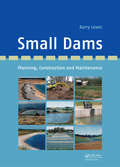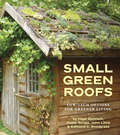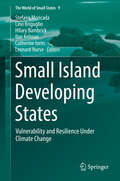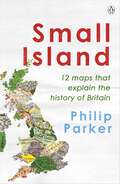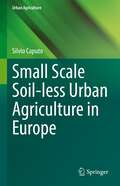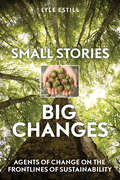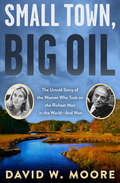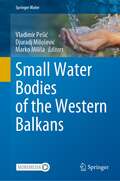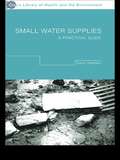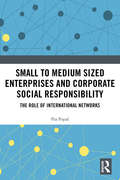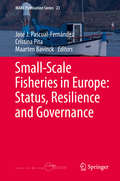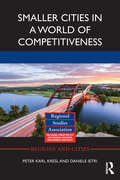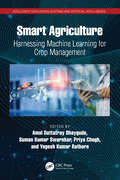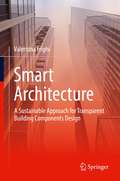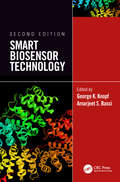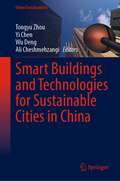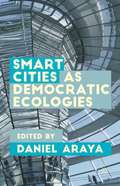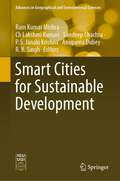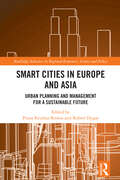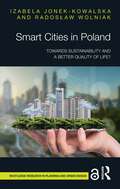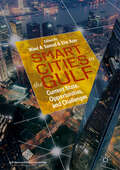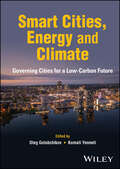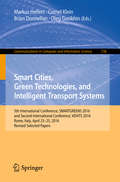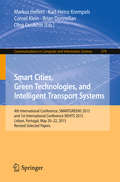- Table View
- List View
Small Dams: Planning, Construction and Maintenance
by Barry LewisSmall Dams: Planning, Construction and Maintenance has been written to provide a practical approach and guide to determining catchment yield and the amount of water required in a dam, advising on selecting and working with engineers and contractors, as well as outlining the cause of dam failures and how to remedy problems quickly. It also covers re
Small Green Roofs: Low-Tech Options for Greener Living
by John Little Edmund C. Snodgrass Nigel Dunnett Dusty GedgeUntil now, the green roof movement has been limited to large-scale, professional endeavors and public buildings. But homeowners everywhere are catching onto the benefits of a green roof—water conservation, energy savings, and storm water management. In Small Green Roofs authors Dunnett, Gedge, Little, and Snodgrass profile ordinary homeowners who scaled green roofs down to the domestic level.Small Green Roofs is the first book to focus on small-scale and domestic green roofs. More than forty profiles of small and domestic-scale projects of all shapes and sizes include green roofs on sheds, garden offices, studios, garages, houses, bicycle sheds, and other small structures, as well as several community projects. For each project, details are given for design, construction, and installation, as well as how-to tips on how the roof was planted and cared for. For readers looking for inspiration when hiring a contractor or taking the adventurous step of building their own, Small Green Roofs provides the knowledge and encouragement to make it possible.
Small Island Developing States: Vulnerability and Resilience Under Climate Change (The World of Small States #9)
by Ilan Kelman Lino Briguglio Stefano Moncada Hilary Bambrick Catherine Iorns Leonard NurseThis book explores how vulnerable and resilient communities from SIDS are affected by climate change; proposes and, where possible, evaluates adaptation activities; identifies factors capable of enhancing or inhibiting SIDS people’s long-term ability to deal with climate change; and critiques the discourses, vocabularies, and constructions around SIDS dealing with climate change. The contributions, written by well-established scholars, as well as emerging authors and practitioners, in the field, include conceptual papers, coherent methodological approaches, and case studies from the communities based in the Caribbean Sea and the Indian, Atlantic, and Pacific Oceans. In their introduction, the editors contextualise the book within the current literature. They emphasise the importance of stronger links between climate change science and policy in SIDS, both to increase effectiveness of policy and also boost scholarly enquiry in the context of whose communities are often excluded by mainstream research. This book is timely and appropriate, given the recent commission by the Intergovernmental Panel on Climate Change (IPCC) of a Special Report that aims at addressing vulnerabilities, “especially in islands and coastal areas, as well as the adaptation and policy development opportunities” following the Paris Agreement. Coupled with this, there is also the need to support the policy community with further scientific evidence on climate change–related issues in SIDS, accompanying the first years of implementation of the United Nations Sustainable Development Goals.
Small Island: 12 Maps That Explain The History of Britain (New History of Britain #1)
by Philip ParkerDiscover the 12 crucial moments in Britain's past that will answer the greatest questions for our future in this richly insightful and fascinating history'A richly entertaining canter through the country's past. Engrossing' INDEPENDENT___________What is Britain?Where lie its boundaries?Why are they always changing?Are we a small island or a big idea?What will we look like next?In Small Island: 12 Maps that Explain the History of Britain, Philip Parker answers these and other crucial questions about this country and its peoples.By pondering our intertwined geography and history, he shows how the past has made Britain and how we might yet shape its future.
Small Scale Soil-less Urban Agriculture in Europe (Urban Agriculture)
by Silvio CaputoThis Monograph focuses on the new approaches that urban agriculture offers to grow food in cities. The author paints a dynamic picture of soil-less and indoor techniques that are currently emerging. A growing number of small scale community-led and entrepreneurial initiatives are using such techniques for diverse objectives: to increase resource efficiency; to strengthen food security; to educate and inform or to exploit new market opportunities. The described studies demonstrate how technologies that are typically used in high-tech food production can also be harnessed in small projects to generate social and economic benefits at a local level. The author puts a focus on three aspects: to outline the context within which small scale soil-less urban agriculture is developing in Europe; to give an overview of the state-of-the-art of projects focusing on this area through case study analysis and to elaborate on emerging questions. Such questions include: is the use of soil-less urban agriculture changing the relationship with, and perception of, what is natural and sustainable for urban farmers and small enterprises working in this sector? What is the perceived potential of these soil-less and indoor forms of urban agriculture to meet environmental, social and economic goals? By answering these and other questions, the volume is a valuable resource for researchers in agriculture and sustainability, as well as urban farmers.
Small Stories, Big Changes: Agents of Change on the Frontlines of Sustainability
by David W. Orr Lyle EstillA remarkable cast of characters inhabit the pages of this book. Meet Tim Toben, who developed a high rise with the lowest energy consumption of any building in the southeastern United States, was foreclosed upon, and lost millions in the process. Gary Phillips held the line against real estate developers in Chatham County and was run out of office for his efforts. Elaine Chiosso has been protecting her watershed by fighting on behalf of the Haw River for twenty-eight years.Unflinchingly honest and compulsively readable, Small Stories, Big Changes provides an intimate look at the personal experience of being a pioneer in the sustainability movement, laying bare the emotional, spiritual, and financial impact of a life lived in the service of change. Activist, farmer, publisher, philosopher or entrepreneur; each writer has a unique personal tale to tell.Small Stories, Big Changes is a book written by ordinary people doing extraordinary things; whose lives have been transformed by their willingness to commit themselves unreservedly to the creation of a better world. Empowering, hopeful, and inspiring, this rich tapestry of voices from the vanguard of change is a must-read for anyone dreaming of a brighter future and seeking a counterbalance to a canon of work that is laced with doom and gloom.Lyle Estill is the president and co-founder of Piedmont Biofuels and the author of Industrial Evolution, Small is Possible, and Biodiesel Power. He has won numerous awards for his commitment to sustainability, outreach, community development, and leadership.
Small Town, Big Oil: The Untold Story of the Women Who Took on the Richest Man in the World—and Won
by David W. MooreHow three New Hampshire women triumphed over an oil billionaire: &“A very timely reminder that when we fight we often win.&”—Bill McKibben Never underestimate the underdog. In 1973, Greek oil shipping magnate Aristotle Onassis—husband of President John F. Kennedy&’s widow, Jacqueline, and arguably the richest man in the world—proposed to build an oil refinery on the narrow New Hampshire coast, in the town of Durham. At the time, it would have cost $600 million to build and was expected to generate 400,000 barrels of oil per day, making it the largest oil refinery in the world. The project was vigorously supported by the governor, Meldrim Thomson, and by William Loeb, the notorious publisher of the only statewide newspaper, the Manchester Union Leader. But three women vehemently opposed the project—Nancy Sandberg, the town leader who founded and headed Save Our Shores; Dudley Dudley, the freshman state rep who took the fight to the state legislature; and Phyllis Bennett, the publisher of the local newspaper that alerted the public to Onassis&’ secret acquisition of the land. Small Town, Big Oil is the story of how the residents of Durham, led by these three women, out-organized, out-witted, and out-maneuvered the governor, the media, and the Onassis cartel to hand the powerful Greek billionaire the most humiliating defeat of his business career, and spare the New Hampshire seacoast from becoming an industrial wasteland. &“Activists and organizers will find lots of ideas and inspirations in this book's detailed account of an epic battle.&”—Bill McKibben &“[An] apt handbook on the power of the people.&”—Providence Journal
Small Water Bodies of the Western Balkans (Springer Water)
by Vladimir Pešić Djuradj Milošević Marko MilišaThe small water bodies such as headwater streams, springs, ditches, small lakes, and ponds are critical to maintaining freshwater biodiversity. This is especially true for Dinaric karst, where they are often the only water bodies present. However, despite their importance, they remain widely overlooked and excluded from government policies like the EU Water Framework Directive. This book includes information on different aspects of these essential but still neglected habitats. This book intends to be of interest to a wide range of audiences, from researchers and conservationists to the public and decision-makers.
Small Water Supplies: A Practical Guide
by David ClaphamThere are approximately 50,000 small water supplies in the UK alone, and thousands more worldwide. Dealing with the idiosyncratic characteristics of small water supplies requires specialist knowledge, and this book provides invaluable guidance for professionals.Based on the extensive practical experience of the author, this book covers how small independent supplies differ from public water supplies, and outlines the health dangers they pose, along with detailed instruction in water sampling and risk assessment techniques. Clapham describes the different types of water supplies including their construction and treatment systems, and discusses common problems encountered. A wide range of case studies bring the theory to life, and both UK and European legislation is discussed. There is also a sizeable section dealing with small water supplies in developing countries.
Small to Medium Sized Enterprises and Corporate Social Responsibility: The Role of International Networks
by Pia PopalWhile the Corporate Social Responsibility (CSR) activities of small firms have been analysed to some extent, their engagement in international networks relating to CSR is less understood. Most of these networks primarily address the needs of multinational corporations. Surprisingly, however, the number of small firms participating in such institutions has substantially increased over recent years. But what is the reason for this new interest of SMEs in institutional forms of CSR? Based on a qualitative empirical study of German small firms’ participation in the most prominent CSR institution, the UN Global Compact, this book explores the drivers for small firms’ participation. The motivations are complex and do not follow the same hierarchical order associated with large business behaviour. Rather, reasons for institutional engagement suggest a heterarchical structure, where alignment is contingent upon factors such as the individual CSR perception, self-conception or social environment. The book explains why small firms prefer to engage in sustainable development within institutionalized forms of CSR rather than act in isolation, and provides recommendations on how to support and thus increase SME participation in institutionalized forms of civic engagement.
Small-Scale Fisheries in Europe: Status, Resilience and Governance (MARE Publication Series #23)
by Maarten Bavinck José J. Pascual-Fernández Cristina PitaThis book offers a comprehensive account of the status and dynamics of people participating in the small-scale fisheries (SSF) of Europe. It covers the situation of SSF in 25 coastal countries, thereby providing a portrait of almost every coastal country on the continent and analyzing the recent evolution of the sector. Small-scale fisheries are argued to be extremely important in Europe, as they provide employment and welfare, while increasing food sovereignty and maintaining communities in coastal areas. The recent worldwide focus on SSF derives from their environmental sustainability, which distinguishes many of their activities from those of large-scale fisheries. This book analyses the diversity of SSF and shows how fishing communities have sometimes developed successful governing models, demonstrating social and economic resilience. While the book emphasizes the strengths of SSF and the synergies that occur with other marine sectors, it also presents cases of failure, in which collective action and policy have actually contributed to a weakening of the sector. In this context, the book shows how governmental policies toward SSF vary considerably from country to country, in a way that is not entirely consistent with European policies.
Smaller Cities in a World of Competitiveness (Regions and Cities)
by Peter Karl Kresl Daniele IetriMuch recent research in Urban Studies has concentrated on the notion of the ‘global city’ but discussion has also covered a larger set of mega cities, with populations in excess of 10 million. This analysis has begged the question of the optimal size for a city – is larger always better? Smaller Cities explores the advantages and disadvantages of different sized cities, trying to determine their place in the global economy and hierarchy. How can smaller cities gain or retain their competitiveness in a world of large cities? In a globalized world, the nation has perhaps been diminished as an economic actor, with fiscal shortcomings and political gridlock leaving cities more or less on their own in the task of enhancing their competitiveness and improving the economic lives of their residents. This book argues that smaller cities of varying population can be important actors in competitiveness and aims to bring attention to an area often overlooked by researchers. In short, are Pittsburgh, San Diego and Austin less competitive than London and Mumbai? This volume will be of interest to students, researchers, and city professionals who work in urban economy and urban geography.
Smart Agriculture: Harnessing Machine Learning for Crop Management (Intelligent Data-Driven Systems and Artificial Intelligence)
by Suman Kumar Swarnkar Yogesh Kumar Rathore Amol Dattatray Dhaygude Priya ChughThis book, Smart Agriculture: Harnessing Machine Learning for Crop Management, is a comprehensive guide designed to explore the various facets of integrating machine learning into agricultural practices. It aims to provide readers with a solid foundation in machine learning concepts while demonstrating their practical applications in real-world farming scenarios. It also examines the role of remote monitoring and precision agriculture, highlighting how technologies such as remote sensing and recurrent neural networks can optimize farming practices.This book:· Emphasizes sustainable agricultural practices and data-driven decision-making for eco-friendly farming. · Highlights the importance of using environmentally friendly practices, and how machine learning can play a pivotal role in achieving sustainability goals. · Discusses topics such as crop optimization, disease detection, pest control, resource management, precision agriculture, and sustainability. · Covers predictive analytics for weather forecasting, Internet of Things applications for precision agriculture, and the role of sensors in data collection. · Illustrates optimizing resource allocation, irrigation with artificial intelligence, and machine learning for soil health assessment. Whether you are a researcher, a student, an agricultural professional, or a technology enthusiast, this book offers valuable insights into the transformative power of machine learning in agriculture. It invites readers to explore the potential of machine learning to transform farming practices, improve food security, and promote environmental sustainability.
Smart Architecture – A Sustainable Approach for Transparent Building Components Design
by Valentina FrighiThis book explores the specific role that glazing technologies play within the world of smart architecture as important components of contemporary and future sustainable architectural and technological research. Smart Architecture begins with a definition of the concept of “smart” in architecture and examines how innovative technologies and materials have shaped buildings over the years. The author then provides a supporting database of contemporary smart architecture—mapping adopted strategies, recognizing common patterns, and evaluating current and future trends in the context of smart building envelopes, energy efficiency, and the development of high-potential innovative building components. The book proceeds with a focus on the specific role that glazing technologies play in this framework and provides a systematic methodology to quantify options for the effective integration of transparent building components within advanced and innovative building envelope systems.
Smart Biosensor Technology
by George K. Knopf Amarjeet S. BassiBased on the success of the first edition, this second edition continues to build upon fundamental principles of biosensor design and incorporates recent advances in intelligent materials and novel fabrication techniques for a broad range of real world applications. The book provides a multi-disciplinary focus to capture the ever-expanding field of biosensors. Smart Biosensor Technology, Second Edition includes contributions from leading specialists in a wide variety of fields with a common focus on smart biosensor design. With 21 chapters organized in five parts, this compendium covers the fundamentals of smart biosensor technology, important issues related to material design and selection, principles of biosensor design and fabrication, advances in bioelectronics, and a look at specific applications related to pathogen detection, toxicity monitoring, microfluidics and healthcare. Features Provides a solid background in the underlying principles of biosensor design and breakthrough technologies for creating more intelligent biosensors Focusses on material design and selection including cutting-edge developments in carbon nanotubes, polymer nanowires, and porous silicon Examines machine learning and introduces concepts such as DNA-based molecular computing for smart biosensor function Explores the principles of bioelectronics and nerve cell microelectrode arrays for creating novel transducers and physiological biosensors Devotes several chapters to biosensors developed to detect and monitor a variety of toxins and pathogens Offers expert opinions on the future directions, challenges and opportunities in the field
Smart Buildings and Technologies for Sustainable Cities in China (Urban Sustainability)
by Ali Cheshmehzangi Wu Deng Yi Chen Tongyu ZhouThis book brings together the insights from professional associations who involved in developing relevant national standards in China, domestic and international scholars who are dedicated to research in related fields, and industry practitioners who have the most hands-on experience. Synthesizing their perspectives, this book discusses the advanced technologies that can meet the requirements for energy efficiency, building performance monitoring and management, and user-centric building services, which are considered the essential components for achieving sustainable and smart cities. Moreover, it provides reflections on the implementation of smart technologies and strategies in practice.
Smart Cities as Democratic Ecologies
by Daniel ArayaThe concept of the 'smart city' as the confluence of urban planning and technological innovation has become a predominant feature of public policy discourse. Despite its expanding influence, however, there is little consensus on the precise meaning of a 'smart city'. One reason for this ambiguity is that the term means different things to different disciplines. For some, the concept of the 'smart city' refers to advances in sustainability and green technologies. For others, it refers to the deployment of information and communication technologies as next generation infrastructure.
Smart Cities for Sustainable Development (Advances in Geographical and Environmental Sciences)
by Ram Kumar Mishra R. B. Singh Anupama Dubey Ch Lakshmi Kumari Sandeep Chachra P. S. Janaki KrishnaThis book reviews the structure, applications, technologies, governance, environmental sustainability, smart communities, gender space and other issues related to smart cities. The book is divided into four parts. The first one entails the conceptual background, growth and development. The second part presents diverse issues on smart cities in terms of environmental sustainability, the role of the community, and gender space, among others. The third part revolves around economic and technological issues, and the fourth is a compilation of case studies in connection with smart cities. This collection of diverse issues from different locations presents a holistic view of smart cities contributed by authors who have undertaken research projects and implemented their own unique perspectives and methods. A variety of innovative concepts such as digital governance, polycentric structures, geodata repositories, geoweb services and advanced geospatial technologies in smart city planning, urban microclimatic parameters, and urban heat islands provide invaluable knowledge for researchers and practitioners in these fields.
Smart Cities in Europe and Asia: Urban Planning and Management for a Sustainable Future (Routledge Advances in Regional Economics, Science and Policy)
by Prana Krishna Biswas Robert DygasThe smart city concept, together with the growing importance of the UN’s Sustainable Development Goals, has a significant impact on city management and governance. This book examines real cases of smart city management across Asia and Europe. It covers regions such as Iceland, Estonia, Poland, Germany, India, Indonesia, Malaysia, Singapore, and Vietnam to systemize the knowledge in the field. It evaluates smart cities’ efficiency and analyzes and assesses the standards, norms and best practices involved in the management of smart cities. The book answers questions such as what it is that makes smart cities stand out, why some countries in Europe and Asia have more smart cities than others, whether smart cities support the economy and GDP growth of the country, and what the main determinants of forming smart cities in Asia and Europe are. It also evaluates whether smart cities secure higher standards of living for their citizens as compared to regular cities. Many theoretical concepts and theories are developed and then verified from the perspective of Western economies. Central Eastern European and Asian countries are frequently overlooked, thus, examining the smart city idea from the viewpoint of non-Western economies offers a fresh insight into the concept and its adaptation and evolution. The range of issues analyzed in the book are multilayered and approached from a wide array of perspectives, from macroeconomics to management, finance and technology, and public policy. Thus, the book is addressed to researchers, students, and academics who specialize in sustainable and regional development, economic geography, and management. It will also be of interest to urban planners, environmental scientists, and policymakers.
Smart Cities in Poland: Towards sustainability and a better quality of life?
by Izabela Jonek-Kowalska Radosław WolniakThis book considers and examines the concept of a Smart City in the context of improving the quality of life and sustainable development in Central and Eastern European cities. The Smart City concept has been gaining popularity in recent years, with supporters considering it to be an effective tool to improve the quality of life of the city’s residents. In turn, opponents argue that it is a source of imbalance and claim that it escalates the problems of social and economic exclusion. This book, therefore, assesses the quality of life and its unsustainability in Central and Eastern European cities within the context of the Smart City concept and from the perspective of key areas of sustainable development. Using case studies of selected cities in Central and Eastern Europe and representative surveysof Polish cities, this book illustrates the process of creating smart cities and their impact on improving the quality of life of citizens. Specifically, this book investigates the conditions that a Smart City has to meet to become sustainable, how the Smart City concept can support the improvement of the residents’ quality of life and how Central and Eastern European countries create smartcity solutions. Containing both theoretical and practical content, this book will be of relevance to researchers and students interested in smart cities and urban planning, as well as city authorities and city stakeholders who are planning to implement the Smart City concept.
Smart Cities in Poland: Towards sustainability and a better quality of life? (Routledge Research in Planning and Urban Design)
by Izabela Jonek-Kowalska Radosław WolniakThis book considers and examines the concept of a Smart City in the context of improving the quality of life and sustainable development in Central and Eastern European cities.The Smart City concept has been gaining popularity in recent years, with supporters considering it to be an effective tool to improve the quality of life of the city’s residents. In turn, opponents argue that it is a source of imbalance and claim that it escalates the problems of social and economic exclusion. This book, therefore, assesses the quality of life and its unsustainability in Central and Eastern European cities within the context of the Smart City concept and from the perspective of key areas of sustainable development. Using case studies of selected cities in Central and Eastern Europe and representative surveysof Polish cities, this book illustrates the process of creating smart cities and their impact on improving the quality of life of citizens. Specifically, this book investigates the conditions that a Smart City has to meet to become sustainable, how the Smart City concept can support the improvement of the residents’ quality of life and how Central and Eastern European countries create smartcity solutions.Containing both theoretical and practical content, this book will be of relevance to researchers and students interested in smart cities and urban planning, as well as city authorities and city stakeholders who are planning to implement the Smart City concept.Chapter 2 and 6 of this book are freely available as a downloadable Open Access PDF at http://www.taylorfrancis.com under a Creative Commons Attribution-Non Commercial-No Derivatives (CC-BY-NC-ND) 4.0 license.
Smart Cities in the Gulf: Current State, Opportunities, And Challenges
by Wael A. Samad Elie AzarIn this edited volume, academics and practitioners from various disciplines investigate the challenges, opportunities and frameworks in the implementation of Smart Cities in the Gulf.The volume presents insightful analyses and identifies key lessons learned through case studies covering four main themes including smart city frameworks and governance, resources and infrastructure, information and communication technologies, and the social perspective. In doing so, the book provides policy recommendations related to smart governance, as well as overall frameworks that cities can adopt in their process of transition, and knowledge that is integral to bridge the gap between various stakeholders in the Smart City milieu. This edited volume comprises extended versions of papers presented at a workshop held at the University of Cambridge, UK titled “Smart Cities in the GCC: Current State, Opportunities and Challenges.”
Smart Cities, Energy and Climate: Governing Cities for a Low-Carbon Future
by Oleg Golubchikov Komali YennetiCollective insight of key thought leaders in the field to clarify and reshape the vision of smart cities Smart Cities, Energy and Climate: Governing Cities for a Low-Carbon Future is a seminal work that draws together insights and case studies on post-carbon urbanism across a variety of fields—from smart energy grids to active buildings, sustainable mobility and urban design. Another objective is to foster an understanding of how digitally-enhanced smart city solutions can assist energy transitions, and what new developments and challenges they bring in areas ranging from urban governance to energy security. Key topics covered in this book include: Recent developments in urban planning, building design and smart technologiesUrban-scale digital platforms and innovation for clean energy systems, energy efficiency and net-zero policiesSocio-technical and political relationships in climate-neutral cities and smart citiesContext-rich, situated perspectives from Europe, Africa and Asia Smart Cities, Energy and Climate serves as a primary reference for scholars, students and policy makers interested in the conceptual, technical, economic and political challenges associated with the transition towards a smart and sustainable urban future.
Smart Cities, Green Technologies, and Intelligent Transport Systems
by Markus Helfert Brian Donnellan Cornel Klein Oleg GusikhinThis book constitutes the thoroughly refereedproceedings of the 4th International Conference on Smart Cities and Green ICTSystems, SMARTGREENS 2015, and the 1st InternationalConference on Vehicle Technology and Intelligent Transport Systems, VEHITS2015, held in Lisbon, Portugal, in May 2015. The 15 full papers of SMARTGREENS 2015 presentedwere carefully reviewed and selected from 73 submissions. VEHITS 2015 received27 paper submissions from which 3 papers were selected and published in thisbook. The papers reflect topics such as smart cities, energy-aware systems andtechnologies, sustainable computing and communications, sustainabletransportation and smart mobility.
Smart Cities, Green Technologies, and Intelligent Transport Systems: 4th International Conference, Smartgreens 2015, And 1st International Conference Vehits 2015, Lisbon, Portugal, May 20-22, 2015, Revised Selected Papers (Communications In Computer And Information Science #579)
by Markus Helfert Karl-Heinz Krempels Brian Donnellan Cornel Klein Oleg GusikhinThis book constitutes the thoroughly refereedproceedings of the 4th International Conference on Smart Cities and Green ICTSystems, SMARTGREENS 2015, and the 1st InternationalConference on Vehicle Technology and Intelligent Transport Systems, VEHITS2015, held in Lisbon, Portugal, in May 2015. The 15 full papers of SMARTGREENS 2015 presentedwere carefully reviewed and selected from 73 submissions. VEHITS 2015 received27 paper submissions from which 3 papers were selected and published in thisbook. The papers reflect topics such as smart cities, energy-aware systems andtechnologies, sustainable computing and communications, sustainabletransportation and smart mobility.
